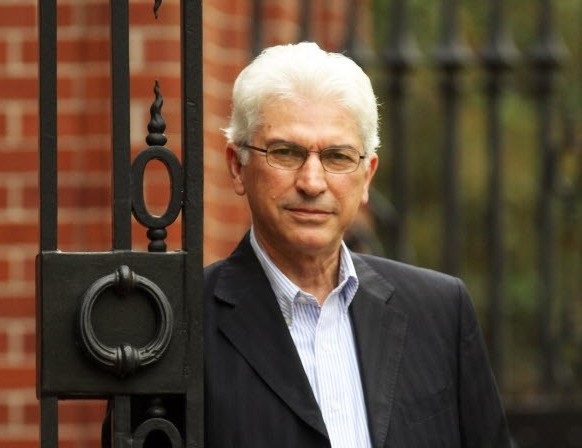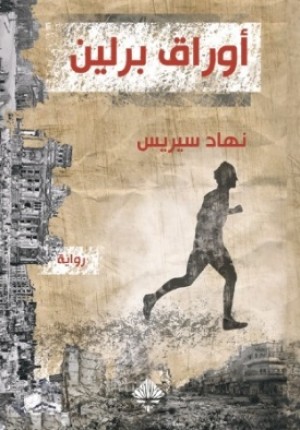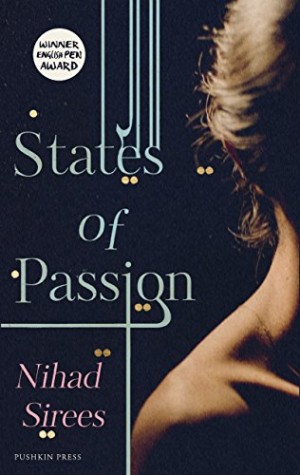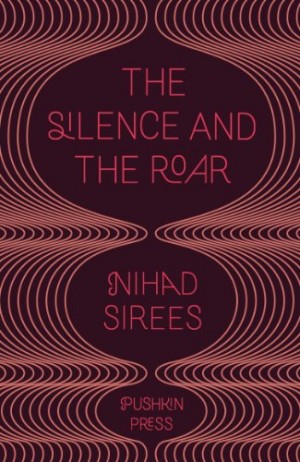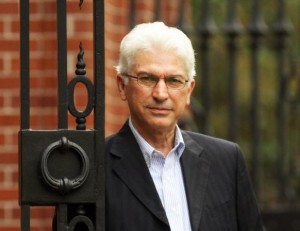Nihad Sirees Photo by Hanna Ward
Novelist & Screenwriter from Syria, he was born in the city of Aleppo (Halab) in 1950, Syria. His literary trends have arisen since childhood when he set out to write one-act plays to be presented on the school stage. He traveled to Bulgaria to study civil engineering and he got a master’s degree in 1976. He came back home to work as an engineer in his private office. His actual and effective literary career has begun lately. He wrote a number of novels, plays, TV dramas and children dramas.
Nihad Sirees is considered one of the realistic writers in Syria in the eighties. His works clearly reflect the environment of Aleppo, and his characters belong to the middle class. He is considered one of the first writers in Syria who write the historical novel. His novel The North Winds has attracted the attention of both readers and critics. It is considered one of the most important historical novels in Syria.
His approach to the field of television-drama is considered remarkable in the widely known serial story of ‘The Silk Market' , which presents the environment, culture and dialect of Aleppo for the first time in the history of the Syrian television-drama. This television-serial has been welcomed by the Syrian and Arab viewers due to its reality, boldness and suspense.
A historical television drama about the life of Lebanese-born American writer and painter Khalil Gibran, written during a stay at the International Writers Program at the University of Iowa in 2005, was produced in Lebanon and screened in 2007 on Arab satellite channels
His novel The Silence and the Roar was banned in Syria, and has been translated into German, French and English and many other languages.
In the wake of the Arab Spring, Sirees was targeted for heightened surveillance by the Assad regime, as a result of which he went into exile in 2012. Initially going to Egypt then he left to Berlin, Germany where he lives right now.
His works are:
Novels
The Cancer (Al-Saratan):
It was firstly issued in 1987 by the publishing house of Mohammed Ali El-Hami in Tunis, then in 1988 by Al-Hewar in Syria and then in 1995 by Al-Fikra in Aleppo. It is about the story of Abdullah who came back from Argentine, where he was immigrant, after he had been suffering from an incurable disease. It is the story of originality, longing for childhood and attitude to both self and the world.
North Winds – The Small Market: (Riyah Al-Shimal):
It was published in 1989 by Al-Hewar Publishing house in Syria. It is an epic of the First World War and of self-consciousness after many centuries of the Turkish Ottoman colonialism. It looks into the war from the view points of its characters who are from the city of Aleppo, and it observes the enlightenment of the national consciousness at that time. It depicts the life of people, hunger and poverty through the story of three young men who are dispatched to different battlefronts, so the war determines the destiny of each one in a different way from the other.
The Small Market is the title of the first part of the trilogy of The North Winds.
Pastoral Comedy (Al-komedia Al-fallahiya):
Published by the author in Damascus in 1990. It is about the tribes who leave the desert because of its tribal struggles and go to settle in a Bedouin quarter around the city of Aleppo. These people infiltrate into the city, exerting an influence on it. The spirit of tribal society prevails throughout the urban society.
North Winds – 1917:
It is the second part of the trilogy of The North Winds. It was published in 1993 by Al-Enmaa Al-Hadari in Aleppo. Here we follow the development of the characters we have known in the first part
States of Passion (Halet Shaghaff):
It was published in 1998 by Attia Publishing House in Beirut. It looks closely at the realm of women and feminine music and singing during the thirties of the 20th century in Aleppo. It is an interesting novel about a case of a passion for a woman that has affected both men and women. It is the case of a passion for a woman and a passion for the tale which later affects the reader.
Under the title States of Passion this novel was translated by Max Weiss and published by Pushkin Press in 2018.
Silk Market (2004): The original novel of the TV series:
Berlin’s Papers:
Released in July 2021, it is about an exiled writer who lives in Berlin while his city is in civil war. We see him moving between the ancient markets of Aleppo and the reconstructed neighborhoods of Berlin after they were demolished. We see him fleeing from a failed love story by exploring the history of Germany in the both world wars, and then getting lost in memories, pictures and maps between western and eastern Aleppo and between West and East Berlin, and turns in the paintings of the German painter "Otto Dix", which embodied the ugliness of the First World War in order to forget the images of destruction and killings that he preserved in his memory.
TV Dramas
Silk Market (Khan Al-Harir):
It is a TV serial of 23 episodes. It was shot and telecast in the beginning of 1996 and was greatly welcomed by viewers. Its events take place in the fifties of the 20th century in Syria where a serious political conflict had taken place and led to the union between Syria and Egypt. This serial depicts the social, economic and political life at the time. The romance and the social struggle are dominant in it.
Al-Thuraya (Al-Thuraya):
It is a TV serial of 33 episodes. It was telecast in the beginning of 1997 and was widely welcomed, too. It won the silver prize in the contest of the social works in Cairo’s Festival for the TV serials and programs in the same year. This serial spotlights the life of the family of a pasha of a Turkish descent both at the eve and in the morning of the moving of the Ottomans out of Syria and the coming of the French. This serial is considered an epic of love and single valor. It depicts an exceptional love story between Thuraya, the Pasha’s daughter, and an anti-Turkish highwayman. Besides, it depicts the beginning of the enlightenment in the Syrian society.
Silk Market (Part II):
It is a TV serial of 25 episodes. It was produced by the Orbit Satellite Channel, was telecast in 1998 and was widely welcomed, too. Here we follow up the situations in Syria at the time of the Syrian-Egyptian union and its impact on the destiny of the characters we had known in the first part. The events continue up to the day of separation from Egypt and the break up of the unity. This serial daringly tries to find out the reason of the separation and spotting those responsible for it. It had raised a wide controversy among the official, educational and popular circles.
First Gleam Of Dawn (AL Khait AL Abiadh):
A social and political drama of 28 episodes, telecast by many Arab-speaking TV stations in 2004. It tells the true story of the media which is totally controlled and supervised by the government. It depicts the government’s endeavors to promote entertainment and comedy programs among TV program makers while trying to ban programs that criticize corruption and mismanagement. These four dramas were directed by Haytham Hakky
The Life of "Kahlil Gibran":
The first TV series about the early life of Kahlil Gibran, the Lebanese-born writer and painter born in 1883. The 30-part series was broadcast throughout the Middle East in 2008. An important figure in Arab literature, Gibran’s career in America which included his work The Prophet made him one of the most famous writers in western popular culture. Directed by Fardos Atassi.
Drama for Children
The Puzzle (Al-Lughz):
A serial of five episodes that was telecast in 1994 and won the bronze prize in the International Cairo’s Festival for the films of children in 1995. It is a story of three children in an elementary school who are fond of reading detective stories. They fall under the effect of such detective stories and suspect two strangers to be criminals. They pursue those two and set traps for them but they finally come to the conclusion that both persons are innocent. It was directed by Layaly Bader
Tammam’s case (Qadiyat Tammam):
It is a serial of eight episodes that was telecast in 1999 and was transformed to an 80-minute movie. It is among the works included to participate in New York’s Festival for the films of children in February 2000. It is the story of a child who tries to prevent his parents from divorce after the mutual understanding between them had become impossible. He tries his best and makes use of all means to do that. He finally succeeds only when he uses a video camera and films their confessions solely. It was directed by Mouhamad Sheikh Najeeb
Theatre
The Playing House (Rules Maker):
It is a one-act play that was published in 1997 in the weekly cultural supplement of Al-Thawra newspaper in Syria. It is now being prepared to be presented on the stage. It is about a master who happens to get a valet to make him to play a certain game the rules of which he makes and continuously changesthese rules to remain the only winner. It is a play of law, tyranny, love andsacrifice.
The First Wife’s Night:
It is a one-act play about loneliness, jealousy, fear and human greed. Its heroine is a woman whose husband marries to another woman. Hence, she tries to make him stay with her, by revealing all her pain and jealousy.
The Piano:
It is a one-act play where a face to face meeting takes place between a man and a woman who had been loving each other but the woman deserts him to get married to his wealthy friend for fear of poverty. Both plays The First Wife’s Night and The Piano was presented in one show in Aleppo in 1999.
